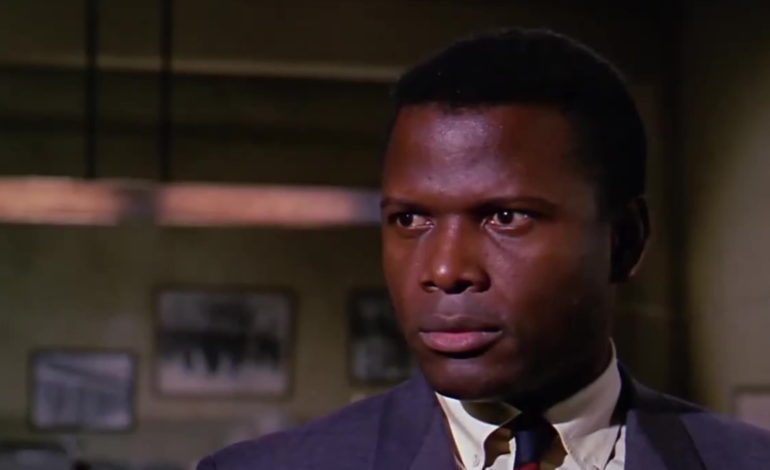

Hollywood legend Sidney Poitier, who made history as the first African-American actor to win an Oscar, has passed away. According to Eyewitness News, the performer and philanthropist died at the age of 94, leaving behind an exultant career that dates back to the 1950s, having made his debut in No Way Out. In later years, he was able to become a star in the industry, his acceptance among the public and critics coinciding with the most intense phase of the Civil Rights Movement in the United States.
That is how Poitier won the Academy Award for Lilies of the Field, released in 1963. Four years later, in 1967, he would play the most popular roles of his career thanks to To Sir, with Love, In the Heat of the Night and Guess Who’s Coming to Dinner. It was his peak as an actor, although in later years he continued to successfully play Detective Tibbs (protagonist of In the Heat of the Night) and accumulated projects at a good pace, spacing his work in the new century.
The son of a Bahamian family, Poitier was born during his parents’ trip to Miami, for which he obtained dual US and Bahamian citizenship. After serving in World War II, he made his acting debut on Broadway entering the radar of a director as prestigious as Joseph L. Mankiewicz, who cast him in a supporting role in No Way Out. It was 1950, and from then on Poitier would manage to work with the greatest directors: shortly afterwards he collaborated with Budd Boetticher in his war drama Red Ball Express, and in 1955 he would meet his first box office hit thanks to Blackboard Jungle, directed by Stanley Kramer and starring Glenn Ford.
This drama centered on the misadventures of a veteran soldier turned teacher was a phenomenon thanks to the presence of “Rock Around the Clock” by Bill Halley & His Comets in its soundtrack, inaugurating the idyll between film and rock and roll. Two years later Poitier starred in William A. Wellman’s Cruel Dilemma and appeared alongside Clark Gable and Yvonne De Carlo in Raoul Walsh’s Band of Angels. In 1958 he was the first black actor to get an Oscar nomination for Stanley Kramer’s The Defiant Ones, where he played a prisoner forced to escape handcuffed to Tony Curtis.
At the end of the decade, he starred with Dorothy Dandridge and Sammy Davis Jr. in the musical Porgy and Bess by Otto Preminger, consolidating his star status when in 1963 he led the cast of Lilies of the Field. Ralph Nelson was directing from a novel by William E. Barrett, which in his film adaptation had Poitier playing a traveling worker who crossed paths with a group of nuns in the Arizona desert. Highly acclaimed by critics, Lilies of the Field went on to obtain five Oscar nominations and earned Poitier the acting award, marking the beginning of an era.
Until then, African-American performers had only won honorary awards (James Baskett for Song of the South) or Hattie McDaniel’s Best Supporting Actress Oscar for Gone with the Wind. Poitier’s victory coincided with unprecedented advances in the fight against racism, which marked the Hollywood of the time and several of his subsequent roles. Thus, and after his role in the biblical production The Greatest Story Ever Told, is how Poitier reached his triumphant year: 1967, where he starred in Guess Who’s Coming to Dinner, In the Heat of the Night and To Sir, with Love.
In the former, he played Spencer Tracy and Katharine Hepburn’s future son-in-law, reflecting the advances of the time while In the Heat of the Night he faced the most violent resistance to them. Winner of Best Picture, Norman Jewison’s film would lead to two sequels that continued the adventures of Detective Tibbs played by Poitier: They Call Me Mister Tibbs! (in 1970) and The Organization (in 1971). He would also reprise his role as Mark Thackeray in To Sir, with Love II, directed by Peter Bogdanovich, also recently deceased, in 1996.
In 1972 Poitier made his filmmaking debut and directed himself, alongside Harry Belafonte, in the western Buck and the Preacher. This became a custom after A Warm December (1973), the blaxploitation comedy Uptown Saturday Night (1974), and his collaborations with Bill Cosby, in Let’s Do It Again and A Piece of the Action. With Stir Crazy, starring Gene Wilder and Richard Pryor in 1980, Poitier broke another record for the highest-grossing film directed by an African-American, reprising with the former in Hanky Panky.
Ghost Dad, starring Bill Cosby again, marked his retirement from directing in 1990. Throughout this decade Poitier began to appear in miniseries and TV movies, as the aforementioned sequel to To Sir, with Love accounts for. This is how he starred in Separate But Equal, Children of the Dust, David and Lisa or The Simple Life of Noah Dearborn, while acting alongside Bruce Willis and Richard Gere in the action movie The Jackal. In 2002 Poitier would receive his second Oscar, this time honorary, for his global contribution to American cinema.
During that same ceremony Denzel Washington, interestingly enough, won the Best Actor Oscar for Training Day, becoming the second performer after Poitier to do so. “I’ll be chasing you, Sidney. I’ll always be following in your footsteps,” Washington stated at the time. Throughout his career, Poitier never neglected his philanthropic work, being appointed Bahamian ambassador to Japan in 1997. From 2002 to 2007, he was also the Bahamas ambassador to UNESCO, publishing his autobiography in 2000, entitled The Measure of a Man: A Spiritual Autobiography.

